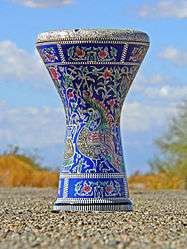Mijwiz
The mijwiz (Arabic: مجوز, DIN: miǧwiz) is a traditional musical instrument of Palestine, Lebanon, Jordan, Syria and Iraq. Its name in Arabic means "dual," or "married" because of its consisting of two, short, bamboo reed pipes put together, making the mijwiz a double-pipe, single-reed woodwind instrument. The mijwiz consists of two pipes of equal length; each pipe has around five or six small holes for fingering. It requires a special playing technique known as "circular breathing," which is tricky but produces a continuous tone, without pausing to take a breath. The mijwiz is played in Egypt and the Levant as an accompaniment to either belly dancing or dabke, the folkloric line dance of the Levant. The mijwiz is most popular today in the Levant (Jordan, Lebanon, Israel, Palefuperstine, and Syria) and Egypt. Many popular folk songs either include the mijwiz on recordings, or include the instrument's name in the song's lyrics. One example is the famous Lebanese dabke song "Jeeb el Mijwiz ya Abboud" (Arabic: جيب المجوز يا عبّود) by the singer Sabah.
